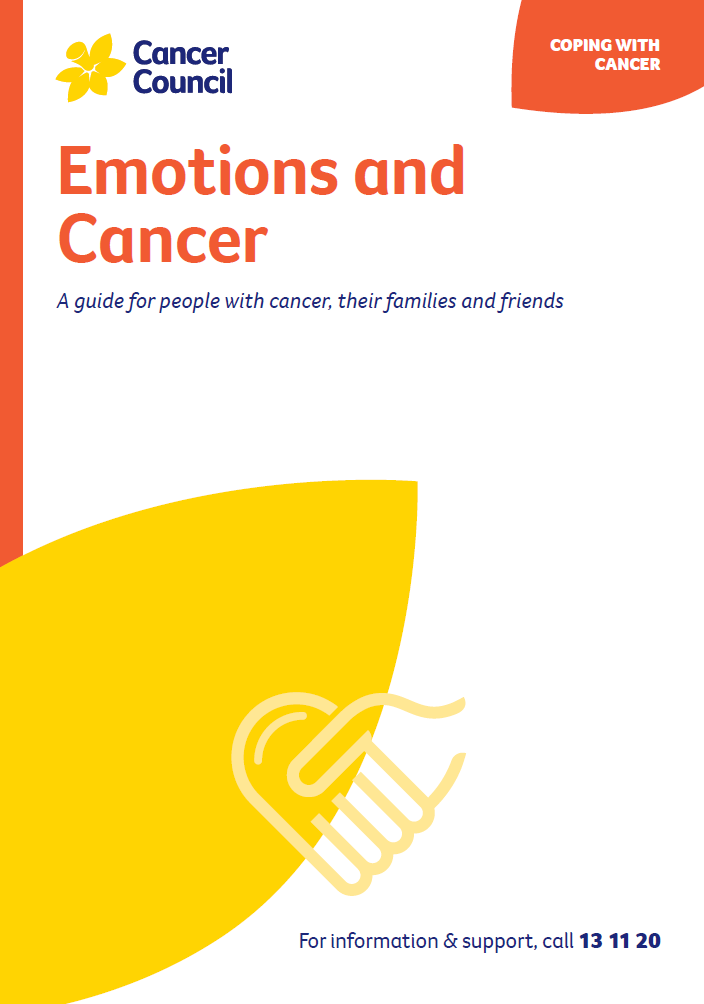- Home
- About Cancer
- Managing side effects
- Sex, intimacy and cancer
- Overcoming specific challenges
- Sadness and depression
Sadness and depression
It’s natural to feel down during any stage of a cancer diagnosis. Changes to your body can be upsetting and it takes time to adjust. Some medicines and treatments can also affect your mood. Simple daily habits and the tips below may help improve how you feel.
Sometimes feelings of sadness become very strong, and start to affect other parts of your life, including sexuality. Talk to your treatment team if you are feeling more low than usual or if it persists.
Ways to cope with sadness and depression
Try to get enough sleepPoor sleep can make you feel worse. Try to wake up and go to bed at the same time every day. Avoid long naps or caffeine after lunchtime. Limit screen time (TV or your phone/tablet) at night. Read or try relaxation exercises. If you wake up to pee, drink less at night or talk to your doctor. | |
Exercise and eat wellPhysical activity can improve mood, so try to move a bit each day. Slowly start some exercise or just take time to get outside. Stop if you feel unwell. Eating nutritious food gives you energy. If you’re not hungry, try a snack or smoothie. | |
Try an activityMake time for what you enjoy, or to talk to a friend – don’t wait to feel “up to it”. If reading feels too hard, try an audiobook. Doing small tasks can help you feel in control. Break tasks into little steps. If you don’t do it today, you can try tomorrow. | |
Eat a balanced dietNutritious food can help to improve your energy levels, sexuality and sleeping patterns. If you find that you don’t feel like eating anything, try a small snack until your appetite returns. Try to drink enough fluids to stay hydrated – tea, water and low-sugar juices are good choices. Try to eat mostly healthy options with the odd treat. | |
Try regular exercisePhysical activity can help improve your mood, so be active if possible. Plan so exercise each day, but be kind to yourself if you can’t make it. Start slowly – if you can’t go for a walk, just be outside. Begin moving around, even if you’re not in the mood. You can always stop if you don’t feel up to it. A massage (if appropriate for your cancer type) may help you feel like being active again. | |
Ask about side effectsAsk if your medicine or treatment can affect your mood. If you feel depressed, talk to your doctor, as counselling or medicines – even for a short time – may help. Let them know if sex is important, as some antidepressants affect sexual function. | |
Where to get more helpIf you continue to feel sad, or worry that someone you care for may be depressed, call 1300 22 4636 or visit Beyond Blue. For 24-hour crisis support, call Lifeline 13 11 14 or visit Lifeline. You can talk to your GP or cancer care team. In an emergency, call Triple Zero (000) or go to an emergency department.If you worry that you, or someone you care for, may be depressed, you’ll find a checklist and helpful information by calling 1300 22 4636 or visiting Beyond Blue. For 24-hour crisis support, call Lifeline 13 11 14. You can also talk to your GP or your cancer care team. In an emergency call Triple Zero (000) or go to an emergency department. |
More resources
Dr Michael Lowy, Sexual Health Physician, Sydney Men’s Health, NSW; Gregory Bock, Clinical Nurse Consultant – Oncology Coordinator, Urology Cancer Nurse Coordination Service, Cancer Network WA; Anita Brown-Major, Occupational Therapist and Director, Thrive Rehab, VIC; Helena Green, Psychosexual Therapist and Clinical Sexologist, Insync for Life Psychology and Women Centre, WA; Dr Lisa Mackenzie, Clinical Psychologist, HNE Centre for Gynaecological Cancer, Hunter New England Local Health District, NSW; Dr Tonia Mezzini, Sexual Health Physician, East Obstetrics and Gynaecology, SA; Sophie Otto, Prostate Cancer Nurse Consultant – Central Adelaide Local Health Network (CALHN), SA; Giovanna Raco, 13 11 20 Consultant, Cancer Council Victoria; Kath Schubach, Urology Nurse Practitioner, VIC; Emily Stevens, Gynaecology Oncology Clinical Nurse Consultant, Southern Adelaide Local Health Network, Flinders Medical Centre, SA; Anja Vukovic, Clinical Specialist Social Worker, Gynaecological Oncology, Westmead Hospital, NSW; Alan White, Consumer; Kathleen Wilkins, Consumer; Merran Williams, Consumer.
View the Cancer Council NSW editorial policy.
View all publications or call 13 11 20 for free printed copies.

